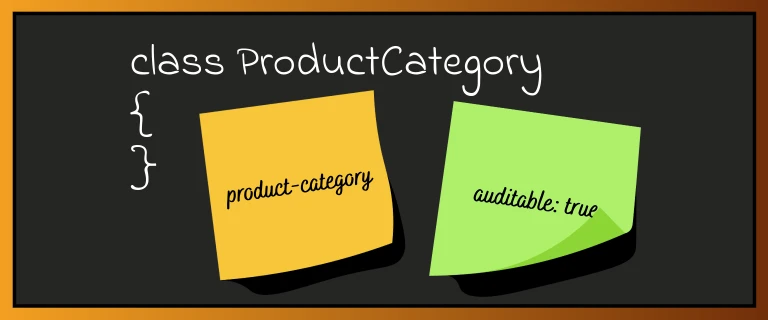Package Spotlight: `zenstruck/class-metadata`

Ever found yourself trying to explain how or why something happened in your app?
Then it's time to implement an auditing feature! This will allow you to track activity
including changes to all your entities. An Activity entity includes a reference to the
modified entity (the entity class name) and the entity's ID. This enables you to later
retrieve and display:
- All activity
- Activity for a specific entity class
- Activity for a specific entity instance
Now, storing the class name in the database does have a few downsides:
- Renaming the class requires a database migration to update potentially 1000's of rows.
- This name isn't human-readable. Being human myself, it would be nice if this activity was displayed in a way that was easy for me to read.
Ok, what about showing the short name of the class? App\Entity\ProductCategory could be
ProductCategory or even converted to kebab-case: product-category. The problem here is
that you can't go the other way: from product-category back to App\Entity\ProductCategory
to query the database for product-category activity.
Enter zenstruck/class-metadata
First, let's install it with:
composer require zenstruck/class-metadata
Note
You'll be prompted to enable the Composer plugin - be sure to do this.
This package enables you to add an #[Alias] attribute to any class in your app:
use Zenstruck\Alias;
#[Alias('product-category')]
class ProductCategory
{
// ...
}Important
Whenever you add or change an attribute, be sure to run:
composer dump-autoload
Behind the scenes, the Composer plugin hooks into the autoload dump process. It scans
your codebase for any #[Alias] attributes and generates a mapping file that enables
superfast lookups. The mapping is pure PHP arrays, so no reflection or scanning is
needed at runtime. But, this does mean you need to run composer dump-autoload
whenever you add or change an alias.
Aliases at Runtime
At runtime, you can get the alias for a class or object like so:
use Zenstruck\Alias;
Alias::for(ProductCategory::class); // "product-category"
// or even
$category = new ProductCategory();
Alias::for($category); // "product-category"In our auditing example, you'd use this when saving activity to the database:
class ActivityManager
{
// ...
function logActivity(object $entity, int $entityId, string $action): void
{
if (!$alias = Alias::for($entity)) {
return; // no alias
}
$this->saveToDatabase($alias, $entityId, $action);
}
}Note
Alias::for() will return null if no alias is found for the given class or object.
To go the other way - from alias to class name - you can do:
Alias::classFor('product-category'); // "App\Entity\ProductCategory"After querying our database for activity, we can use this to get the class name from the stored alias:
class Activity
{
// ...
public function getEntityClass(): ?string
{
return Alias::classFor($this->entityAlias);
}
// ...
}Note
Alias::classFor() will return null if no class is found for the given alias.
Alternative Alias Configuration
What about classes you don't control, like vendor classes? No problem! You can configure
these in your app's composer.json file:
{
"extra": {
"class-metadata": {
"map": {
"Galactic\\Fleet\\Hyperdrive": "hyperdrive"
}
}
}
}Additional Metadata
Say we don't want all entities to be auditable - easy, they just need to be marked as such. We have a couple options:
- Use a marker interface (an interface without methods), e.g.
AuditableInterface, and have auditable entities implement it. - Create a custom class attribute, e.g.
#[Auditable], and add it to auditable entities.
These both work, but this package provides a third option: the #[Metadata] attribute:
use Zenstruck\Metadata;
#[Metadata('auditable', true)]
class ProductCategory
{
// ...
}Important
Metadata is also picked up by the Composer plugin during the autoload dump process. Be sure to run:
composer dump-autoload
whenever you add or change metadata.
Now, before logging activity, we first check if the entity is auditable:
use Zenstruck\Metadata;
class ActivityManager
{
// ...
function onEntityChange(object $entity, int $entityId, string $action): void
{
if (!Metadata::get($entity, 'auditable')) {
return; // not auditable
}
$this->logActivity($entity, $entityId, $action);
}
}Note
Metadata::get() will return null if the given key is not found for the class or object.
Check out the Metadata Lookup documentation for more exciting usages!
Listing all Aliases and Metadata
Don't have all of your configured aliases and metadata memorized? No problem, the package's Composer plugin provides a command to list them all:
composer list-class-metadata
The output looks something like this:
---------------------------- ------------------ --------------------
Class Alias Metadata
---------------------------- ------------------ --------------------
App\Entity\ProductCategory product-category {"auditable":true}
---------------------------- ------------------ --------------------Whether you need simple aliases for storage, or metadata to drive business logic, this package keeps things fast, organized, and clean.
👉 Check out the GitHub repo to get aliasing!
3 Comments
Hey @Zairigimad!
I'm glad you dig it! To your question: yep, exactly what you describe happens on duplicate aliases.
--Kevin

Brilliant idea, does it manage conflicts? If we have two classes with the same alias, will it throw an error in the dump?